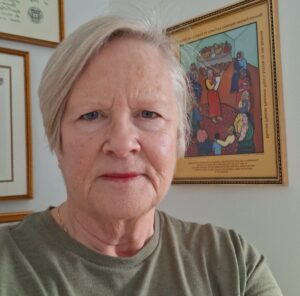A Pope Who Knelt to Serve: Honoring Francis’ Diaconal Legacy
Pope Francis began his papacy by kneeling.
It was Holy Thursday, just three weeks after his election in 2013. While tradition would have placed him at the grand Basilica of St. John Lateran, Pope Francis chose instead to go to a youth prison on the outskirts of Rome. There, in a concrete chapel at Casal del Marmo, he bent low to wash the feet of twelve incarcerated young people—two of them women, two of them Muslim.
Before he knelt, he removed the ornate chasuble that marks a presider. Then, subtly, intentionally, he shifted his stole across his chest diagonally—the way a deacon wears it.
This wasn’t a headline moment. There was no press release. But for those of us paying attention, this small gesture was overflowing with meaning. Pope Francis was showing us what diakonia—the heart of Christian service—looks like.
Over the twelve years of his papacy, he returned again and again to this theme. He urged the Church to go out, not stay safe. To bring the Gospel to the margins, not wait for the world to come knocking. He reminded us that true leadership looks like washing feet. That authority in the Church must be rooted in humility, mercy, and proximity to the suffering Christ in our midst.
And he didn’t just preach it—he practiced it.
He kept returning to prisons on Holy Thursday. Just days before his death, he made his final such visit, greeting 70 women and staff in a Roman correctional facility. He left all that remained from his personal bank account to support prison ministries in Rome. In doing so, he showed once more that a Church on the move must bring its presence, sacraments, and love to the forgotten corners of our world.
He also elevated the importance of the diaconate in the life of the Church. In Deacons: Servants of Charity, a collection of his writings on the diaconate, Pope Francis called deacons a “sign and instrument” of the Church’s own vocation to service. He saw them not as liturgical assistants, but as ministers of communion who push the whole Body of Christ toward the peripheries—toward the places of pain and possibility where the Spirit is already at work.
“The Church,” he wrote, “sees in the permanent diaconate the expression and, at the same time, the vital impetus to become a visible sign of the diaconia of Christ the Servant.”
Para quienes formamos parte del proyecto Discerning Deacons, estas palabras son un modelo a seguir. Creemos, al igual que el Papa Francisco, que los diáconos encarnan la llamada de la Iglesia a ser sinodal: a caminar juntos, a escuchar profundamente y a compartir la responsabilidad de la vida de la Iglesia. Los diáconos suscitan los dones de los bautizados. Nutren a los cansados, acompañan a los afligidos y levantan a los olvidados o marginados.
In a time when many are tempted to lose hope in the Church’s ability to change or to truly listen, Pope Francis kept pointing us back to the source: to Jesus, who kneels at our feet. He reminded us again and again that it is not only priests or bishops who are called to minister. The whole Church, in all its baptized members, is sent forth to live the Gospel.
He did not resolve every question we carry. Many Catholics hoped that his pontificate would end with a definitive affirmation of women’s inclusion in the diaconate. That discernment continues. But Pope Francis created space for the conversation. He kept the door open. And he reminded us that the Spirit does not rush, but it does move.
He also reformed the structures of Vatican governance to include women in leadership roles. He expanded opportunities already permitted by canon law and gave women a vote for the first time in a synod of bishops. These are not symbolic gestures—they are seeds for transformation.
Perhaps most significantly, Pope Francis rekindled the Church’s diaconal imagination. He invited us to see that the Church is most herself when she is serving. When she is bending down to help another. When she is removing her vestments of power and choosing to be close to those who suffer.
Francis took the name of a saint who may have been a deacon. He lived like one, too. Saint Francis of Assisi, he wrote, was “the man all deacons should be inspired by”—a man of peace, of poverty, of kinship with creation.
That’s the Church Pope Francis gave his life to build. And that’s the Church we are committed to becoming.
Thank you, Bishop of Rome, for kneeling. For listening. For trusting in the slow, faithful work of the Spirit.
We will carry your towel and basin forward. We will keep walking the synodal path. We will not forget the message you gave us, with your words and with your life:
The greatest among you must be the servant of all.
Lisa Amman lives in St. Paul and is a parishioner at St. Thomas More Catholic Church in St. Paul. She is Deputy Director of Engagement for Discerning Deacons, a project to contribute to the renewal of the diaconate and to discern including women in the order of deacons.


